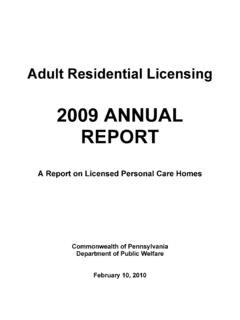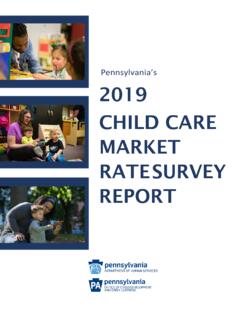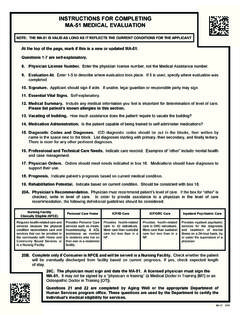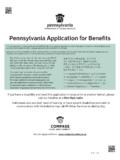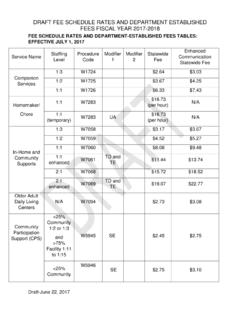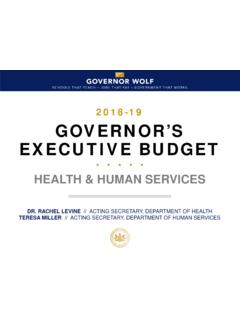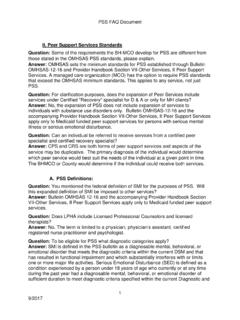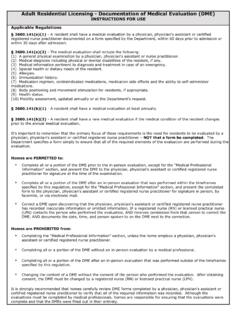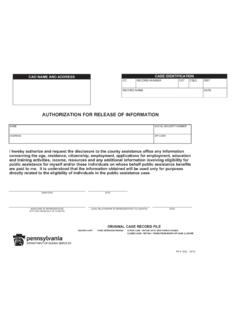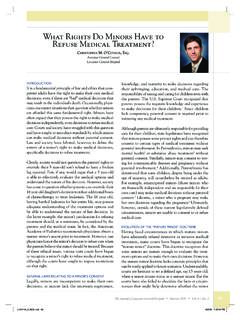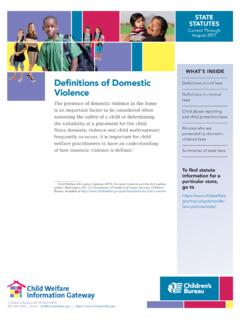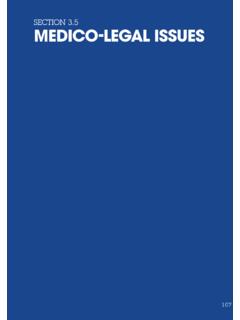Transcription of MANDATED REPORTERS - Department of Human Services
1 Is the child Protective Services Law (CPSL)?The PA child Protective Services Law (CPSL) was signed into law in 1975. It was enacted to protect children from abuse , allow the opportunity for healthy growth and development, and, whenever possible, preserve and stabilize the is child abuse ? child abuse , according to the CPSL, means to intentionally, knowingly or recklessly do any of the following: Cause bodily injury to a child through any recent act or failure to act; Fabricate, feign, or intentionally exaggerate or induce a medical symptom or disease which results in a potentially harmful medical evaluation or treatment to the child through any recent act; Cause or substantially contribute to serious mental injury to a child through any act or failure to act or a series of such acts or failures to act; Cause sexual abuse or exploitation of a child through any act or failure to act.
2 Create a reasonable likelihood of bodily injury to a child through any recent act or failure to act; Create a likelihood of sexual abuse or exploitation of a child through any recent act or failure to act; Cause serious physical neglect of a child ; Cause the death of the child through any act or failure to act; or Engage a child in a severe form of trafficking in persons or sex trafficking, as those terms are defined under section 103 of the Trafficking Victims Protection Act of 2000 (114 Stat. 1466, 22 7102 ). child abuse also includes certain acts in which the act itself constitutes abuse without any resulting injury or condition. These recent acts include any of the following: Kicking, biting, throwing, burning, stabbing, or cutting a child in a manner that endangers the child ; Unreasonably restraining or confining a child , based on consideration of the method, location or the duration of the restraint or confinement; Forcefully shaking a child under one year of age; Forcefully slapping or otherwise striking a child under one year of age; Interfering with the breathing of a child ; Causing a child to be present during the operation of a methamphetamine laboratory, provided that the violation is being investigated by law enforcement.
3 And/or Leaving a child unsupervised with an individual, other than the child s parent, who the parent knows or reasonably should have known was required to register as a Tier II or III sexual offender or has been determined to be a sexually violent predator or violent delinquent. As pertaining to the CPSL, recent is defined as an abusive act within two years from the date the report is made to ChildLine. Sexual abuse , serious mental injury, serious physical neglect, and deaths have no time REPORTERSFREQUENTLY ASKED QUESTIONSMANDATED REPORTERS | FREQUENTLY ASKED can be a perpetrator?A perpetrator of child abuse can be a: child s parent; Spouse or former spouse of the parent; Paramour or former paramour of the parent; Person 14 years of age or older responsible for the welfare of a child or having direct contact with children as an employee of child care Services , a school, or through a program, activity or service, such as a baby sitter or day care staff person; Person 14 years of age or older residing in the same home as the child .
4 Relative who is 18 years of age or older who does not reside in the same home as the child , but is related within the third degree of consanguinity or affinity by birth or adoption to the child ; or An individual 18 years of age or older who engages a child in severe forms of trafficking in persons or sex trafficking, as those terms are defined under section 103 of the Trafficking Victims Protection Act of 2000 (114 Stat. 1466, 22 7102). A perpetrator of child abuse for failure to act can be a: child s parent; Spouse or former spouse of the parent; Paramour or former paramour of the parent; or Person 18 years of age or older who is responsible for the child s welfare or who resides in the same home as the child .
5 MANDATED REPORTERS do not have to determine whether or not the person meets the definition of perpetrator in order to make the is a MANDATED reporter?The following adults are considered MANDATED REPORTERS and are required to report suspected child abuse if they have reasonable cause to suspect that a child is a victim of child abuse : Individuals licensed or certified to practice in any health-related field under the jurisdiction of the Department of State Medical examiner, coroner, or funeral director Employees of a health care facility or providers licensed by the Department of Health who are engaged in the admission, examination, care, or treatment of individuals.
6 School employees Employees of child care Services who have direct contact with children in the course of employment. Clergymen, priests, rabbis, ministers, Christian Science practitioners, religious healers, or spiritual leaders of any regularly established church or other religious organization. Individuals paid or unpaid who, on the basis of the individuals role as an integral part of a regularly scheduled program, activity, or service, are responsible for the child s welfare or has direct contact with children Employees of a social Services agency who has direct contact with children in the course of employment Peace officers or law enforcement officials Emergency medical Services providers certified by the Department of Health Employees of a public library who have direct contact with children in the course of employment Individuals supervised or managed by a person listed above.
7 Who have direct contact with children in the course of employment Independent contractors who has direct contact with children Attorneys affiliated with an agency, institution, organization or other entity, including a school or regularly established religious organization that are responsible for the care, supervision, guidance, or control of children Foster parents Adult family members who are responsible for the child s welfare and provide Services to a child in a living home, community home for individuals with an intellectual disability or host home for children which are subject to supervision or licensure by the Department under Articles IX and X of the Human Services must MANDATED REPORTERS make a report?
8 MANDATED REPORTERS are required to make a report of suspected child abuse if they have reasonable cause to suspect that a child is a victim of child abuse under any of the following circumstances: They come into contact with the child in the course of employment, occupation, and practice of a profession or through a regularly scheduled program, activity or service; They are directly responsible for the care, supervision, guidance, or training of the child , or are affiliated with an agency, institution, organization, school, regularly established church, or religious organization or other entity that is directly responsible for the care, supervision, guidance, or training of the child ; A person makes a specific disclosure to the MANDATED reporter that an identifiable child is the victim of child abuse .
9 Or An individual 14 years of age or older makes a specific disclosure to the MANDATED reporter that the individual has committed child is not required that the child come before the MANDATED reporter in order to make a report of suspected child abuse nor are they required to identify the person responsible for the child abuse to make a report of suspected child if a MANDATED reporter has general concerns about a child , but does not suspect abuse ?Concerns related to the safety of children including, but not limited to inadequate housing, clothing, and supervision, can be referred to ChildLine or the county children and youth agency for assessment as general protective Services do MANDATED REPORTERS report suspected child abuse ?
10 MANDATED REPORTERS must make an immediate and direct report of suspected child abuse to ChildLine either electronically at or by calling anyone within my institution, school, facility, or agency need to be notified after a report is made?After making the report to ChildLine, MANDATED REPORTERS are required to immediately thereafter notify the person in charge of the institution, school, facility, or agency or the designated agent of the person in else must be done after making a report to ChildLine?If an oral report was made to ChildLine, a report of suspected child abuse (CY 47) must also be completed and forwarded to the county children and youth agency within 48 hours after making the report.

